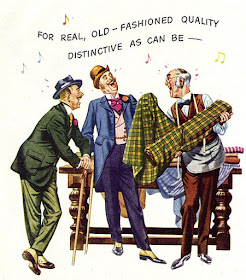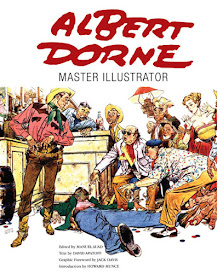The newest book is about Albert Dorne (1906-1965), who had a dynamic cartoon-illustration style that was popular for both story illustration (above), and advertising (below).

Dorne was a hard-working, self-made success. He brought a no-nonsense approach to the business and cofounded the Code of Ethics and Fair Practices of the Profession of Commercial Art and Illustration.
He had an extensive photo reference collection, and he worked quickly, producing a vast body of images, most of which haven't been seen recently except by collectors of old magazines. The bulk of the new book is pure artwork, beautifully reproduced, with some preliminary sketches to show Dorne's process.

Illustration historian David Apatoff chronicles Dorne's career and tells how he founded the Famous Artists' School. Apatoff's writing style is very readable, full of information and anecdote. There's also an introduction by Howard Munce, who knew Dorne, a recollection by Dorne's daughter Barbara Dorne Bullas, and a "graphic foreword" by Jack Davis, one of many cartoonists who Dorne inspired.
The other book, which came out earlier, and is more expensive now, is about Robert Fawcett (1903-1967), justifiably dubbed the "illustrator's illustrator." His pictures are mostly ornate colored drawings with a profusion of intriguing and believable detail.
Fawcett is best known for his Sherlock Holmes illustrations, twelve of which are included here.

Like Dorne, Fawcett was a legend among his peers, and this book is packed full of nicely printed examples. Some are taken from printed tearsheets and show the vintage graphics that went with the original illustration. Many others are scanned from originals. Altogether, there are more than a hundred color illustrations and numerous black and white drawings. Both books are hardcover, 9 x 12 inches, about 182 pages.
Let's hope that Mr. Auad and Mr. Apatoff will keep producing more of these great resources on classic illustrators.
------
At Amazon:
Albert Dorne: Master Illustrator
Robert Fawcett: The Illustrator's Illustrator
Auad Publishing
Online portfolio on Leif Peng's Flickr sets:
Al Dorne (157 images)
Robert Fawcett (179 images)
Author David Apatoff also does the Illustration Art blog



This is wonderful. I hope that someday I can add both (and subsequent similar books) to my library.
ReplyDeleteJames, do you think there's any doubt that the mid-twentieth century is the true Golden Age of Illustration? I know that hindsight is 20/20, and we don't have the perspective yet to clearly judge the illustration of today, but personally, I couldn't argue otherwise.
Thanx for posting this! It is really great to have these guys’ work published in such an accessible way. The online slide-show portfolios on Leif Peng's Flickr pages are an especially nice presentation of the works. I’m w Tom on the mid-twentieth century being the true Golden Age of Illustration. In addition to the time being ripe as far as a broad range of commercial publication opportunities with the explosion of the pulp-fiction and the advertising industries, along w the ever expanding and urbanization of the middle class, it was also a very interesting transitional period of technologies and culture. Keep up the good work James, you are amazing!! -RQ
ReplyDeletei heard that a Bernie Fuchs book is in the works. Looking forward to that one.
ReplyDeleteTom and Roberto, I've heard the term "Golden Age of Illustration" used to refer to an earlier period, often from about 1890-1925 or so. But I like the idea of extending it all the way through to the end of the '50s, or even into the 60's. It's true that television and photography knocked out a lot of the industry by the late '60s. There's great stuff from every period, of course, and no one knows they're in a golden age of anything when they're living through it.
ReplyDeleteMatt, I'd love to see a book on Fuchs, and on Harry Anderson and Tom Lovell and a host of others.
Tom, here's another answer about the Golden Age of Illustration from historian and collector Richard Kelly: "Jim—This is the period we collect, and we’ve always gone with 1890-1935. From the beginning of the periodical boom to the middle of the depression when the magazines had shrunk and illustrations were no longer in such high demand. There was also a drop-off in the quality of work with Cormwell and Schaeffer around this time, Ward had gone to watercolor and Wyeth was headed toward tempura. They just seem like easy start/finish dates."
ReplyDeleteI agree with Roberto and Tom; This is good stuff. Thank you for sharing it. Also, want to thank you for the post about Harry Anderson the other day. I started reading about him online, and looking at his paintings. There were a lot that brought back memories once I learned that he painted all those religious pieces in his later years. I know I've seen "What happened to your Hand?" as a child.
ReplyDeleteHmm...Do you think we might be in a new golden age for illustration? What makes any time period golden anyway?
James, from talking with a lot of old time illustrators, I think "the golden age" of illustration is the age that ended just before you began working.
ReplyDeleteIllustrators in the 1950s looked over their shoulders at the era Richard Kelly described, and said,"it must have been great back then." Illustrators in the 80s looked over their shoulders and said, "gee, illustrators in the 1960s and 70s had the most artistic freedom to experiment and go wild, and got more space in magazines for their work (and more money). It must have been great back then."
Perhaps the golden age is partially a psychological condition, as well as an objective, quantifiable condition.
Thanks very much, James for highlighting these two books. Manuel performs a very valuable service by rescuing hundreds of images by these two artists and reviving them for another generation.
Even though Amazon lists it for over $100, the Fawcett book is available here: http://www.shopthepost.com/rofailil.html and its currently on sale!
ReplyDeleteThe Fawcett book is also on the Auad page for the same price ($34.95 + S&H) as the Dorne one, unless I am missing something.
ReplyDeleteJames- Thanx for the clarification of terms.
ReplyDeleteIf the period from N.C.Wyeth (Died: October 19, 1945 aged 62) to Rockwell (Died: November 8, 1978 aged 84) isn’t the ‘Golden Age’ perhaps it was the ‘Golden-plated Age’ or the ‘Golden-Alloy Age’ or maybe the ‘Fauxlden Age.’ (I think David Apatoff may be on to something.) Nostalgia just isn’t what it used to be! ;) -RQ